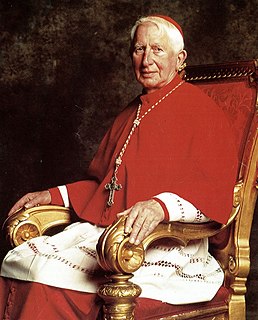A Quote by Charles Spurgeon
Brethren, who are we that God should have been so good to us?
Quote Topics
Related Quotes
For us Christians, love of neighbour springs from love of God; and it is its most limpid expression. Here one tries to love one's neighbour, but also to allow oneself to be loved by one's neighbour. These two attitudes go together, one cannot be exercised without the other. Printed on the letterhead of the Missionaries of Charity are these words of Jesus: "as you did it to one of the least of these my brethren, you did it to me". Loving God in our brethren and loving our brethren in God.
Feeble are we? Yes, without God we are nothing. But what, by faith, every man may be, God requires him to be. This is the only Christian idea of duty. Measure obligation by inherent ability! No, my brethren, Christian obligation has a very different measure. It is measured by the power that God will give us, measured by the gifts and possible increments of faith. And what a reckoning will it be for many of us, when Christ summons us to answer before Him under the law, not for what we are, but for what we might have been.
If we feel that any habit or pursuit, harmless in itself, is keeping us from God and sinking us deeper in the things of earth; if we find that things which others can do with impunity are for us the occasion of falling, then abstinence is our only course. Abstinence alone can recover for us the real value of what should have been for our help but which has been an occasion of falling. ... It is necessary that we should steadily resolve to give up anything that comes between ourselves and God.
Why God should want and need us is a mystery. But it is true: otherwise he would not have created us and life would ultimately have no meaning for us. It is good to remember that in God the is a constancy, a consistency of attitude which never changes, irrespective of what we are or how we act: he never changes in is wanting us or needing us.
I am persuaded, from all the facts that have come to me, that it would have been possible, if we had functioned as the Lord intended us to function, if we had paid our tithes and our offerings as the Lord intended us to pay them, we might have gone on without one dollar from our federal government. And has it ever occurred to you what a mighty influence we should have exercised for good and for respect and for all of the virtues that we have been taught, and that God has commanded us to exercise and cultivate and practice, if we had just followed along what he has asked us to do?
There are two gods. The god our teachers teach us about, and the God who teaches us. The god about whom people usually talk, and the God who talks to us. The god we learn to fear, and the God who speaks to us of mercy. The god who is somewhere up on high, and the God who is here in our daily lives. The god who demands punishment, and the God who forgives us our trespasses. The god who threatens us with the torments of Hell, and the God who shows us the true path.
There are two gods. A god who casts us off because of our sins, and a God who calls to us with His love.
When we think of the height of God's infinity we should not despair of His compassion reaching us from such a height; and when we recall the infinite depth of our fall through sin we should not refuse to believe that the virtue which has been killed in us will rise again. For God can accomplish both these things: He can come down and illumine our intellect with spiritual knowledge, and He can raise up the virtue within us and exalt it with Himself through works of righteousness.
...it is proper that the duty of helping the poor and unfortunate should especially stir Catholics, since they are members of the Mystical Body of Christ. In this we have come to know the love of God, said John the Apostle, that He laid down His life for us, and we likewise ought to lay down our life for the brethren. He who has the goods of this world and sees his brother in need and closes his heart to him, how does the love of God abide in him? (1Jn 3:16 17)



































